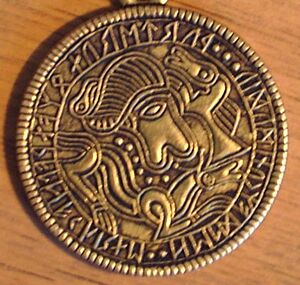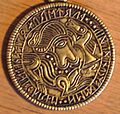*Walhaz facts for kids
The word *Walhaz is a very old word from a language called Proto-Germanic. This language was spoken by ancient Germanic people. The word *Walhaz meant 'foreigner' or 'someone from the Roman Empire'. It could also mean a 'Roman-speaker' or a 'Celt' who had adopted Roman ways.
You can still see parts of this old word in English today! For example, the names 'Wales' and 'Cornwall' come from *Walhaz. The ancient Germanic people used this word to describe people living in the old Roman Empire. These people often spoke Latin languages and had adopted Roman culture.
Other languages also have words from *Walhaz. For instance, in Old Norse, valskr meant 'French'. In Old High German, walhisk meant 'Romance' (referring to languages like French or Italian). Even today, in parts of Switzerland and South Tyrol, the German word welsch is used for people who speak Romance languages.
Where Did the Word *Walhaz Come From?
The word *Walhaz is a loanword, which means it was borrowed from another language. It came from the name of an ancient Celtic tribe called the Volcae. The Romans knew them as Volcae, and the Greeks called them Ouólkai.
The Volcae tribe lived near the Germanic people. It's believed that the Proto-Germanic people started calling them *Walhaz. Later, this word *Walhaz (or its plural *Walhōz) was used more generally. It described many of the Germanic people's southern neighbors.
You can still find this word in place names today. For example, Walchgau and Walchensee in Bavaria, Germany, have parts of *Walhaz in their names. Places with *walhaz in their names often show where people who spoke Romance languages lived among Germanic speakers.
How *Walhaz Became Vlach
In Old English, the word *walhaz changed into wealh. It still meant 'a foreigner'. More specifically, it referred to the people who lived in Britain before the Anglo-Saxons arrived. These people spoke Celtic or Latin, or both.
Over time, wealh also started to describe the social position of these native British people. In some parts of Old English, it even meant 'slave'. An old feminine form of *walhaz, called wiln, meant 'a female slave'. This word was mostly used in the southern parts of England.
The word *Walhaz also traveled to other groups of people. From the Slavs, it went to the Hungarians, who used oláh for Vlachs (especially Romanians). They used olasz for Italians. The Turks used Ulahlar, and the Byzantines used Vláhi. These words were used for many Latin-speaking people in the Balkans.
Images for kids
See Also
- Vlachs, also known as Wallachs
- Theodiscus
- Names of the Celts
 | Georgia Louise Harris Brown |
 | Julian Abele |
 | Norma Merrick Sklarek |
 | William Sidney Pittman |



